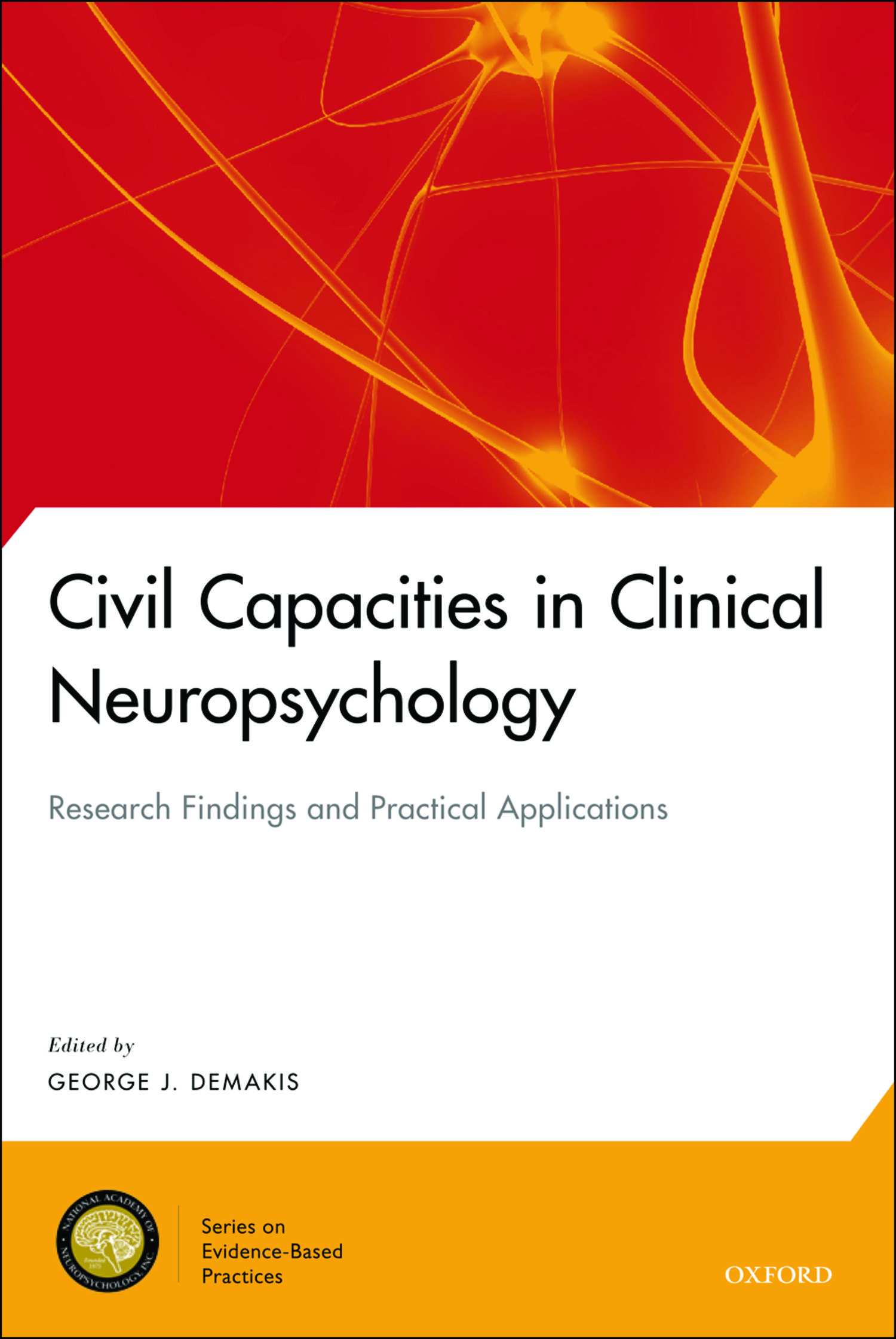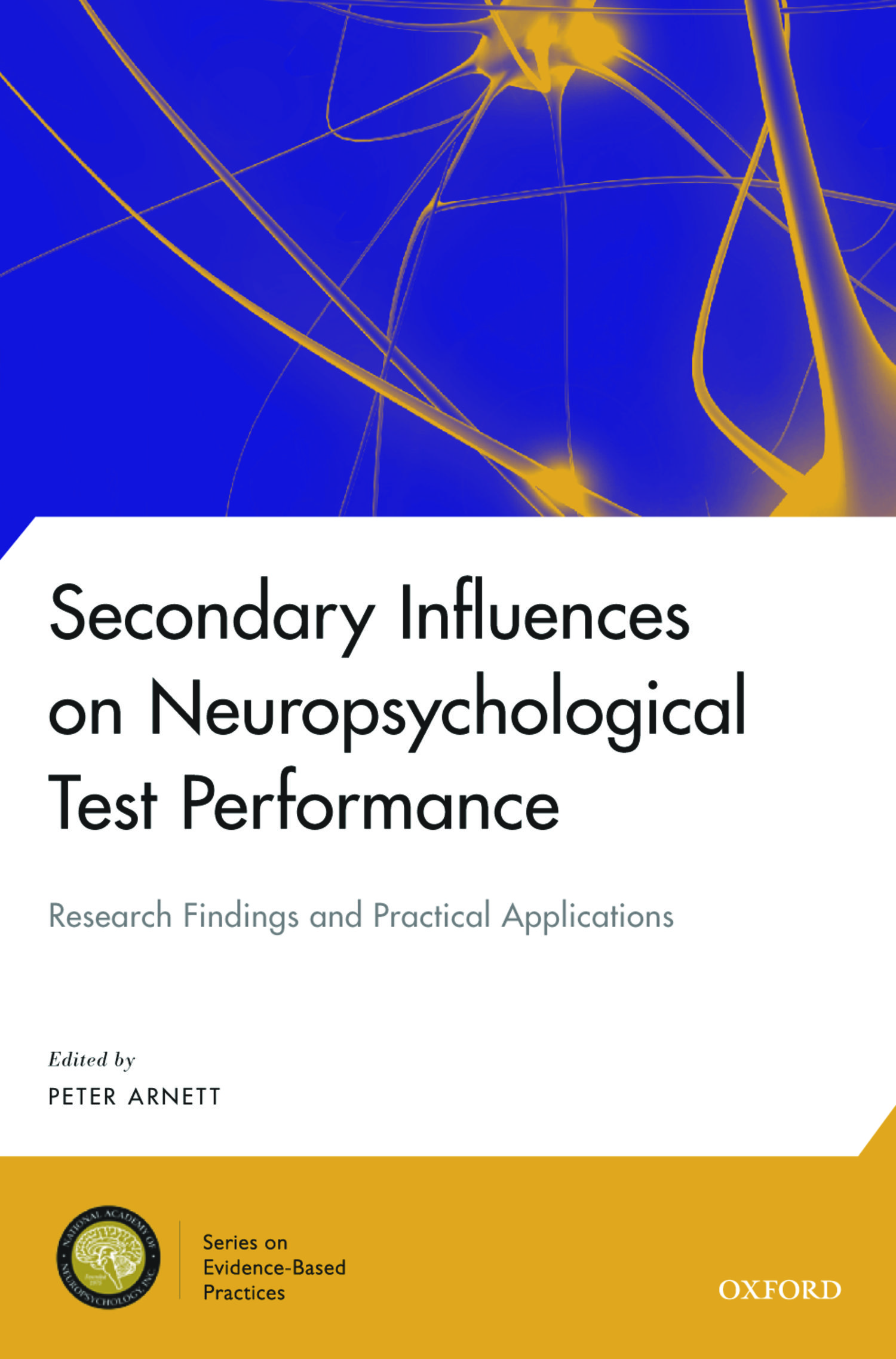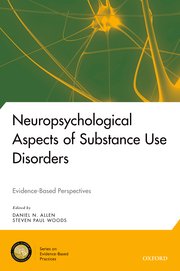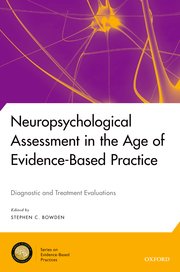
Series Editor: L. Stephen Miller, Ph.D.
The National Academy of Neuropsychology Book Series on Evidenced-Based Practice is an exciting direction for NAN. It is derived from the recognition of the need for accessible materials focusing on empirical evidence aimed at improving the quality of informed clinical decision making.
The Series aims to provide thorough and accurate resources directly applicable to the everyday needs and demands of clinical neuropsychology, and that are presented in a meaningful and accessible way, offering the latest knowledge based on the most recent and rigorous scientific evidence within the field.
The Series is designed to be a dynamic and ever-growing set of resources for the science-based clinical neuropsychologist. As such, the volumes are intended to individually focus on specific significant areas of neuropsychological inquiry in depth, and together cover the majority of the broad clinical area of neuropsychology. This is a challenging endeavor, and one which relies on the foremost experts in the neuropsychological field to provide their insight, knowledge, and interpretation of the empirically-supported evidence within each focused topic.
Each volume is intended to provide an exhaustive review of their respective topic, yet there are a number of constants across the volumes including a commitment to providing evidence-based information, maintaining a consistent format, the provision of information directly and readily usable to the clinical neuropsychologist in everyday practice, and the provision of information in such a way as to make it accessible as a "pull off the shelf" resource. Finally, each volume is designed to work within a pedagogical strategy that educates and informs the knowledgeable neuropsychologist and providing meaningful (i.e., read "useful") information geared toward enhancing the practice of neuropsychology.
Current Volumes in the National Academy of Neuropsychology Series on Evidence-Based Practices:
- Civil Capacities in Clinical Neuropsychology: Research Findings and Practical Applications, Edited by George Demakis
- Secondary Influences on Neuropsychological Test Performance, Edited by Peter Arnett
- Neuropsychological Aspects of Substance Use Disorders: Evidence-Based Perspectives, Edited by Daniel N. Allen and Steven Paul Woods
- Neuropsychological Assessment in the Age of Evidence-Based Practice: Diagnostic and Treatment Evaluations, Edited by Stephen C. Bowden
Read the NAN Book Series & Earn CE Credit
You can earn 7 CE credits per book in the NAN Book Series by reading one of the designated books and completing an online quiz.
To Receive CE Credit:
- Read one of the CE-designated books in its entirety (you must purchase one of the designated books online).
- Register for the specific book for which you wish to receive CE credit (book is not included).
- Correctly complete all questions on the quiz.
Cost to Earn CE Credit:
- Members: $75
- Non-Members: $95
 Civil Capacities in Clinical Neuropsychology: Research Findings and Practical Applications
Civil Capacities in Clinical Neuropsychology: Research Findings and Practical Applications
Edited by George Demakis
Purchase the Book
Clinical neuropsychologists are increasingly involved in the evaluation of civil capacities and are in demand by other professionals, particularly attorneys and judges, to assist their decision-making about these sometimes complex issues. While there has been some neuropsychological research in this area, this has not been assembled into a single volume nor have practice recommendations been provided. This volume fills these gaps. The first part of this volume reviews and synthesizes the research literature on neuropsychological aspects of civil capacities. The specific capacities addressed include driving, financial and healthcare decision-making, testamentary (i.e., will-making) capacity, and personal care and independence. Each chapter addresses relevant background issues, conceptual/theoretical advances, and empirical findings. The chapters also include an illustrative case study that demonstrates how the authors (each expert in the various areas) evaluated and conceptualized the case. Each chapter is written from an evidence-based perspective and, where appropriate, uses research to inform practice recommendations. The second part of this volume provides recommendations to practitioners on how to conduct civil capacity evaluations that utilize neuropsychological assessment. There are chapters on an evaluative framework for the assessment, capacity test selection and psychometric issues, working with other data sources besides testing (e.g., collateral interviews), best practices in report-writing and testifying, as well as common ethical issues in such cases. Throughout, these chapters provide practical "how to" advice to improve neuropsychological practice and consulting in civil capacity cases. In addition to these chapters, there is a chapter written by legal consumers of psychological reports. This chapter offers a wealth of useful information and recommendations that, if followed, will further serve to advance psychological report-writing and consultation in civil capacity evaluations.
Upon completion of this CE activity, the reader will be able to:
- Summarize basic issues and concepts in civil capacity evaluations.
- Compare clinical assessment of capacity and legal determination of competency.
- Develop a framework for the evaluation of civil capacities.
- Identify non-cognitive influences on decisional capacity.
- Outline legal issues and procedures in the competency evaluation.
- Discuss ethical issues in capacity and competency evaluations.
- Detail recommendations for future research on civil capacity instruments.
Target Audience: Neuropsychologists, physicians, attorneys
Instructional Level: Intermediate
NAN members login and non-members create an account to:

 Secondary Influences on Neuropsychological Test Performance
Secondary Influences on Neuropsychological Test Performance
Edited by Peter Arnett
Purchase the Book
It has long been appreciated among clinical neuropsychologists that both primary and secondary factors contribute to cognitive dysfunction in neurological patients. Primary influences are the direct result of the extent and location of damage to the brain. Secondary influences stem from something associated with brain injury or disease besides the specific areas of the brain affected. For example, a patient with a neurological disease may develop depression, something which in turn often impacts cognitive functioning. Other secondary factors associated with disease besides depression can also negatively impact cognitive functioning, including anxiety, pain, fatigue, and motor impairments, to name a few.
Despite the widespread appreciation of the importance of such secondary factors on cognitive functioning in clinical neuropsychology, there has never been a single source for this information that is readily available to clinicians and researchers. The present volume provides such a source, using an evidence-based framework comprised of two broad sections. The first section includes chapters that comprehensively address particular secondary influences, independent of any particular neurological disorder. For example, there are chapters on the impact on cognitive functioning of depression, anxiety, fatigue, pain, diagnosis threat, and symptom invalidity. The second section has chapters that focus on specific neurological conditions and the most salient secondary factors that need to be considered in these conditions. Multiple Sclerosis, HIV, Parkinson's Disease, Traumatic Brain Injury, Alzheimer's Disease/MCI/Stroke, and Epilepsy are all considered. The chapters include vivid case studies that illustrate the principles outlined in the chapters to help clinicians consider how such principles can apply to particular patients. Chapters also include evidence-based guidelines for clinical practice. The final chapter highlights some areas especially in need of further research and study that will be of particular interest and importance to clinicians.
Upon completion of this CE activity, the reader will be able to:
- Describe the distinction between primary and secondary influences on cognitive impairment.
- Discuss the range of secondary influences that should be considered in neuropsychological evaluation.
- Explain why examining secondary influences in a neuropsychological context is important.
- Prepare for the assessment of secondary factors that may be causing/contributing to cognitive and functional deficits.
- Interpret neuropsychological results in the context of secondary factors.
- Describe several key areas for future investigation in relation to secondary influences on cognitive functioning.
Target Audience: Neuropsychologists
Instructional Level: Intermediate
NAN members login and non-members create an account to:

 Neuropsychological Aspects of Substance Use Disorders: Evidence-Based Perspectives
Neuropsychological Aspects of Substance Use Disorders: Evidence-Based Perspectives
Edited by Daniel N. Allen and Steven Paul Woods
Purchase the Book
In Neuropsychological Aspects of Substance Use Disorders, internationally recognized experts provide clinicians with the most up to date information on the neuropsychology of substance use disorders based on the empirical literature. Substance use disorders continue to be a major health concern in the United States and worldwide, although their causes and effective treatments remain elusive. Research in this area has expanded dramatically over the past two decades and provided insights into psychobiological, behavioral, and genetic factors that contribute to the onset and maintenance of substance use disorders and associated neuropsychological abnormalities. This research has provided a strong empirical foundation that has direct implications for clinical neuropsychological practice and created a need to provide the practitioner with a cogent and up-to-date summary of current developments, which is the goal of this volume. Chapters in this volume are organized into three sections that are designed to provide a translational overview of basic research and treatment findings regarding addictions, neuropsychological and neurological sequalae of the most common substances of abuse, and consideration of special issues that might confound interpretation of neuropsychological test results. Section I provides an overview of addictions, including diagnoses based on the DSM-IV, as well as the most current conceptualizations of addiction from psychobiological, genetic, and behavioral and no economics perspectives, providing the reader with a broad evidence-based conceptual framework. Section II reviews the most common substances of abuse including coverage of structural and functional neuroimaging findings, epidemiological evidence, and neuropsychological sequelae. Substances included in this section represent the most commonly encountered drugs of abuse. Section III includes coverage of the number of special topics, including specific issues related to psychiatric, medical, and neurological comorbidities. Topics included in this section represent areas of common concerns faced by clinical neuropsychologists in the interpretation and application of neuropsychological test results.
Upon completion of this CE activity, the reader will be able to:
- Summarize the basic biological, social, and genetic theoretical perspectives on the addiction process.
- Describe translational research that uses findings from basic science to develop state-of-the-art evidence-based interventions.
- Describe the epidemiology, psychosocial correlates, and common comorbidities of substance use disorders.
- Discuss neuroanatomical, neurophysiological, and neurocognitive effects of the most common drug classes.
- Develop tailored assessment batteries to increase sensitivity to effects of substance abuse and assist in discerning etiologies.
- Explain specific issues related to psychiatric, medical, and neurological comorbidities that commonly occur with substance use disorders.
Target Audience: Psychologists, neuropsychologists, psychiatrists, and other healthcare professionals working with persons with substance use disorders
Instructional Level: Intermediate
NAN members login and non-members create an account to:

 Neuropsychological Assessment in the Age of Evidence-Based Practice: Diagnostic and Treatment Evaluations
Neuropsychological Assessment in the Age of Evidence-Based Practice: Diagnostic and Treatment Evaluations
Edited by Stephen C. Bowden
Purchase the Book
Evidence-based practice has become the benchmark for quality in healthcare and builds on rules of evidence that have been developed in psychology and other health-care disciplines over many decades. This volume aims to provide clinical neuropsychologists with a practical and approachable reference for skills in evidence-based practice to improve the scientific status of patient care. The core skills involve techniques in critical appraisal of published diagnostic-validity or treatment studies. Critical appraisal skills assist any clinician to evaluate the scientific status of any published study, to identify the patient-relevance of studies with good scientific status, and to calculate individual patient-probability estimates of diagnosis or treatment outcome to guide practice. Initial chapters in this volume review fundamental concepts of construct validity relevant to the assessment of psychopathology and cognitive abilities in neuropsychological populations. These chapters also summarize exciting contemporary development in the theories of personality and psychopathology, and cognitive ability, showing a convergence of theoretical and clinical research to guide clinical practice. Conceptual skills in interpreting construct validity of neuropsychological tests are described in detail in this volume. In addition, a non-mathematical description of the concepts of test score reliability and the neglected topic of interval estimation for individual assessment is provided. As an extension of the concepts of reliability, reliable change indexes are reviewed and the implication of impact on evidence-based practice of test scores reliability and reliable change are described to guide clinicians in their interpretation of test results on single or repeated assessments. Written by some of the foremost experts in the field of clinical neuropsychology and with practical and concrete examples throughout, this volume shows how evidence-based practice is enhanced by reference to good theory, strong construct validity, and better test score reliability.
Upon completion of this CE activity, the reader will be able to:
- Summarize foundational concepts of test reliability and validity.
- Discuss the assessment of cognition and psychopathology within a theoretical context.
- Identify valid methods in neuropsychological assessment.
- Describe advanced understanding of evidence-based practice in neuropsychology.
- Critique skills for evaluating the patient-relevance of published diagnostic validity and treatment studies.
- Practice critical appraisal of a treatment study.
- Practice critical appraisal of a diagnostic validity study.
Target Audience: The book is targeted to advanced graduate students and early career professionals as well as professionals at any stage of career development who wish to increase knowledge of principles of evidence-based practice.
Instructional Level: The instructional level covers intermediate-level principles of psychological assessment as well as advanced-level coverage of evidence-based practice.
NAN members login and non-members create an account to:
